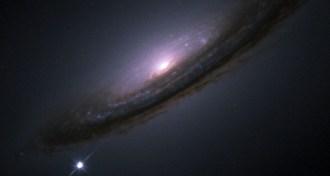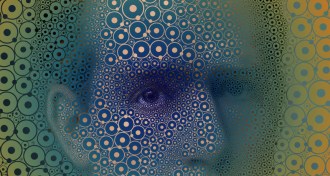
Tom Siegfried is a contributing correspondent. He was editor in chief of Science News from 2007 to 2012, and he was the managing editor from 2014 to 2017. He is the author of the blog Context. In addition to Science News, his work has appeared in Science, Nature, Astronomy, New Scientist and Smithsonian. Previously he was the science editor of The Dallas Morning News. He is the author of four books: The Bit and the Pendulum (Wiley, 2000); Strange Matters (National Academy of Sciences’ Joseph Henry Press, 2002); A Beautiful Math (2006, Joseph Henry Press); and The Number of the Heavens (Harvard University Press, 2019). Tom was born in Lakewood, Ohio, and grew up in nearby Avon. He earned an undergraduate degree from Texas Christian University with majors in journalism, chemistry and history, and has a master of arts with a major in journalism and a minor in physics from the University of Texas at Austin. His awards include the American Geophysical Union's Robert C. Cowen Award for Sustained Achievement in Science Journalism, the Science-in Society award from the National Association of Science Writers, the American Association for the Advancement of Science-Westinghouse Award, the American Chemical Society’s James T. Grady-James H. Stack Award for Interpreting Chemistry for the Public, and the American Institute of Physics Science Communication Award.

Trustworthy journalism comes at a price.
Scientists and journalists share a core belief in questioning, observing and verifying to reach the truth. Science News reports on crucial research and discovery across science disciplines. We need your financial support to make it happen – every contribution makes a difference.
All Stories by Tom Siegfried
-
 Physics
PhysicsTop 10 physicists with no Nobel
While a lot of people are busy predicting who will win Nobel Prizes this week, it would be easier to predict who won’t get the physics prize because they’re dead and therefore no longer eligible. Plus there are those who deserve it and are still alive but probably won’t get it because the Nobel guys don’t seem to like theorists very much.
-

-

-

-

-
 Space
SpaceBelief in multiverse requires exceptional vision
If you can’t see it, it doesn’t exist. That’s an old philosophy, one that many scientists swallowed whole. But as Ziva David of NCIS would say, it’s total salami. After all, you can’t see bacteria and viruses, but they can still kill you. Yet some scientists still invoke that philosophy to deny the scientific status […]
-
 Space
SpaceLong the stuff of fantasy, wormholes may be coming soon to a telescope near you
For decades now, black holes have been the rock stars of popular astrophysics, both fact and fiction. Physicists rely on them to explain all sorts of mysterious astrophenomena, and black holes have been essential plot devices in various films, from Star Trek (2009) to Galaxy Quest (1999) to (obviously) The Black Hole (1979). But black […]
-
 Math
MathSystems biology tunes in to cancer networks
If cable TV systems had a channel called The Cancer Network, doctors would be wise to tune in. But there’s no such channel. So for now, they’ll just have to read articles in scientific journals that publish papers on the science of networks. Scientists in the new field of systems biology have made a lot […]
-

-
 Health & Medicine
Health & MedicineEven if science can’t make life longer, perhaps a pill can make a long life better
To live long and prosper (physically, not financially), you’d probably rather take a pill than starve yourself. So far, though, most of the evidence says very-low-calorie diets are the best strategy for living a longer life. At least if you’re a worm or a fly. It hasn’t been established that less food means a longer […]
-
 Life
LifeMicrobes at home in your gut may also be influencing your brain
When your gut grumbles or growls, it’s speaking to your brain. And it’s a perfectly reasonable thing to do. Evolution favors guts that can tell a brain what they want. So it’s not surprising that the brain and the gut should have a reliable communications connection. But suppose the gut’s messaging system was hacked by […]
-
 Humans
HumansGreed may breed financial fitness, but evolution allows unselfishness to survive
If greed is good, as Gordon Gekko proclaimed in the 1987 movie Wall Street, then economics ought to be a superlative science. After all, at the core of economic theory sits a greedy idealization of human nature known as Homo economicus. It’s a fictitious species that represents the individual economic agent, motivated by selfishness. H. […]